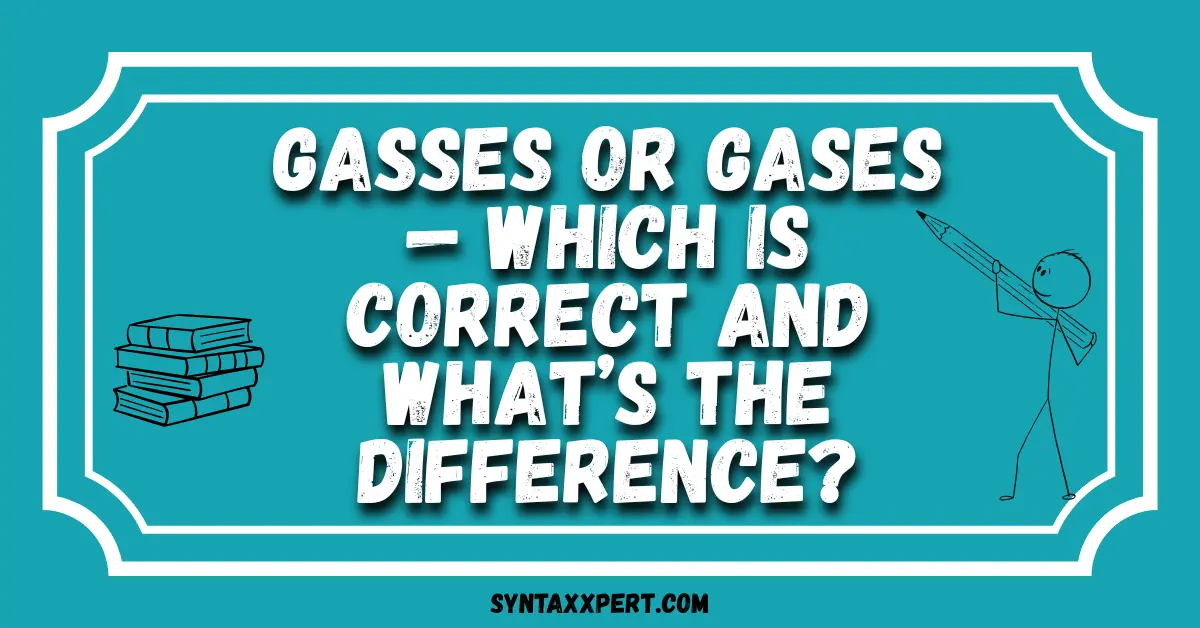Gasses or gases — a small spelling change, a big difference. If you’ve ever typed one of them and hesitated, you’re far from alone. Even fluent writers and editors second-guess which one is right.
Here’s the quick takeaway: “Gases” is the correct plural noun form of “gas,” while “gasses” serves as a verb meaning “to supply with gas” or “to expose to gas.”
But why do we have two words that look almost identical? Why do some people insist both are acceptable? And how can you remember which to use without stopping mid-sentence? Let’s unpack everything — from grammar rules to scientific usage — so you never mix them up again.
Quick Answer — “Gases” vs “Gasses” at a Glance
| Word | Part of Speech | Meaning | Example Sentence |
| Gases | Noun (plural of gas) | Substances in a gaseous state | “Oxygen and nitrogen are the main gases in our atmosphere.” |
| Gasses | Verb (3rd-person or plural form of to gas) | To supply, expose, or poison with gas | “The mechanic gasses up the car before a trip.” |
In short:
- When talking about things — molecules, elements, air — use gases.
- When talking about actions — something or someone doing the gassing — use gasses.
Why “Gasses” and “Gases” Get Confused
The confusion springs from English’s quirky spelling habits. We’re taught that many short-vowel words double the final consonant before adding a suffix:
- run → running
- pass → passes
- plan → planned
So instinct says gas → gasses. But that rule doesn’t apply to nouns ending in an -s sound because doubling the letter doesn’t change pronunciation.
That’s why “gas” → “gases” (not “gasses”) for plural. The word already ends with a strong /s/ sound, so we simply add -es to make it pronounceable and grammatically correct.
Grammar Rules Behind “Gas → Gases”
- Rule 1: Add “-es” to nouns ending in s, ss, sh, ch, x, or z.
- class → classes
- box → boxes
- gas → gases
- Rule 2: Double the final consonant only when it affects pronunciation. Doubling helps preserve a short vowel sound (as in run → running), but “gas” already has a short vowel. Doubling the s doesn’t change how it sounds, so we skip it.
- Rule 3: Keep “gasses” only for verb forms of to gas.
- He gasses the car.
- They were gassed during the test.
That’s the simplest way to remember it: noun = gases, verb = gasses.
When to Use “Gases” — The Plural Noun
Whenever you’re talking about more than one gas, the word is gases.
Examples:
- “Scientists collect data on greenhouse gases.”
- “The doctor uses medical gases during surgery.”
- “Different gases expand at different temperatures.”
Tip: If you can replace the word with substances or elements, “gases” fits.
Scientific Contexts
Science loves precision, and in fields like chemistry, physics, and environmental studies, “gases” is the only accepted plural.
Common scientific categories:
- Greenhouse gases: carbon dioxide, methane, nitrous oxide
- Noble gases: helium, neon, argon, krypton, xenon
- Toxic gases: chlorine, ammonia, sulfur dioxide
In academic writing or lab reports, using “gasses” instead of “gases” would look like a typo.
So for any scientific, academic, or technical content — it’s always “gases.”
When to Use “Gasses” — The Verb Form
“Gasses” shows action. It’s what happens when someone supplies or exposes something to gas.
Examples:
- “The technician gasses up the tanks before the flight.”
- “The villain gasses the room in the movie scene.”
- “The dentist gasses patients before surgery.”
The word “gasses” also appears in informal slang, especially American English:
- “He gasses up his team before the match.” (means “motivates or hypes up”)
Grammar note: The verb to gas follows regular conjugation:
- Present simple: He gasses
- Past: He gassed
- Continuous: He is gassing
- Past participle: They have gassed
So the double-s belongs in verb tenses, not in the plural noun.
“Gases” in Science and Daily Life
In the Classroom
Teachers and students often discuss gases while studying states of matter — solids, liquids, and gases.
- Gases are substances with neither fixed shape nor volume.
- They expand to fill their containers.
- Their particles move freely and rapidly.
In Everyday English
We use “gases” casually, too:
- “The gases from the stove should be vented outside.”
- “Traffic emissions release harmful gases.”
The plural noun shows up everywhere — from weather forecasts to environmental reports. If you’re describing multiple air-like substances, “gases” wins every time.
A Deeper Dive: “Gasses” in Common Expressions
Though rare, “gasses” survives in modern language as a verb.
1. Automotive slang:
- “He gasses up the car” = fills the tank with fuel. 2. Informal hype:
- “She’s gassing me up” = she’s flattering or hyping me. 3. Historical usage:
- “The troops were gassed during the war.”
So while “gasses” is grammatically legitimate, its meaning changes completely depending on context. Use it only when describing an action, not a thing.
Etymology — Where “Gas” Comes From
The story begins in the 1600s with Jan van Helmont, a Flemish chemist who coined “gas” from the Greek word “chaos.”
He used it to describe invisible, formless substances that expand and fill space — what we now call gases. The term spread quickly through scientific communities in Europe.
By the 17th century, “gas” had settled into English as both a scientific and everyday word. Its plural form “gases” followed standard English patterns.
For a short time in 19th-century Britain, “gasses” appeared as an alternative plural, but dictionaries like Oxford and Merriam-Webster later standardized “gases” as the correct form.
British vs American English: Any Real Difference?
Nope — both follow the same rule.
- British: “The factory released several gases.”
- American: “The factory released several gases.”
While older British literature may contain “gasses” as a plural noun, modern English universally agrees: “gases” is correct. Both Oxford English Dictionary and Cambridge English mark “gasses (noun)” as nonstandard.
Grammar Tip — The Easy Way to Remember
Here’s the simplest memory trick:
If it’s something you can see or measure — it’s gases. If it’s something someone does — it’s gasses.
Or even shorter:
Substances = gases. Actions = gasses.
Visual learners might picture:
- Beakers of gases in a lab 🧪
- A mechanic gasses up a car ⛽
Same word family, totally different roles.
Common Errors and How to Fix Them
| ❌ Wrong Sentence | ✅ Correct Sentence | Why |
| The experiment measured three gasses. | The experiment measured three gases. | Talking about multiple substances → plural noun. |
| He gases the engine daily. | He gasses the engine daily. | Verb form → correct double-s. |
| Scientists study noble gasses like helium. | Scientists study noble gases like helium. | Plural noun → use “gases.” |
| The driver gasses up before leaving. | The driver gasses up before leaving. | Action (verb) → correct usage. |
Scientific Importance of the Word “Gases”
Because “gases” shows up constantly in science, using it correctly matters.
In Chemistry
“Gases” refers to substances whose molecules move freely and fill any container — examples: oxygen, nitrogen, hydrogen.
In Environmental Science
“Greenhouse gases” trap heat, contributing to global warming. Scientists analyze their concentrations, not “gasses.”
In Medicine
Doctors administer “anesthetic gases” to sedate patients. Again, “gases” is the standard term across all medical publications.
Using “gasses” instead would undermine credibility in professional writing. That’s why science writers, teachers, and students alike stick with “gases.”
Linguistic Insight — Why English Chose “Gases”
Linguists classify “gas” as a mass noun that can pluralize when referring to distinct types. The plural “gases” evolved naturally alongside similar nouns:
- class → classes
- glass → glasses
Phonetically, adding “-es” avoids the awkward hiss of “gasss.” It creates a smooth transition between syllables: gas-iz instead of gasss.
That’s why “gases” feels easier to pronounce and read — and why dictionaries lock it in as standard.
Historical Usage Trends
Corpus data from Google Books shows that “gases” overtook “gasses” as the dominant plural in the early 1900s.
By 1950, “gases” was 30 times more common in published English, and “gasses” appeared only in verb contexts. Today, over 95% of all usage of this root word in modern English refers to “gases.”
So historically and statistically, “gases” is the winner by a landslide.
READ MORE >>> Impatient vs Inpatient: The Easy Way to Remember the Difference
Extra Grammar Nuggets
- Past tense: gassed → “The car was gassed up.”
- Gerund: gassing → “He is gassing the balloons.”
- Plural noun: gases → “Different gases react under pressure.”
See how English keeps “gases” distinct from its verb family? That distinction helps maintain clarity in writing and speech.
Frequently Asked Questions
Is “gasses” ever correct as a plural noun?
Not in modern English. “Gasses” is considered a verb form, not a noun. Use “gases” for plural nouns.
Why isn’t it “gasses” like “passes”?
Because doubling the s doesn’t help pronunciation. “Gas” already ends with an s-sound; adding “-es” is enough to form the plural smoothly.
Is “gasses” used in the UK?
Only as a verb. British and American English both use “gases” for plural nouns.
Which one is more common — “gases” or “gasses”?
“Gases” dominates all major dictionaries, corpora, and Google search results. “Gasses” is rare outside of verb phrases.
What’s the plural of “gas” in chemistry?
Always “gases.” For example: The noble gases include helium and neon.
Can I use “gasses” in Scrabble?
Yes, but only as the verb “to gas.” It’s valid in Scrabble dictionaries because verbs count.
Are “gases” and “vapors” the same?
Not exactly. Gases are substances naturally in gaseous form at room temperature; vapors come from liquids that have evaporated.
Is “gasses” ever acceptable in formal writing?
No. Unless you’re using it as a verb (e.g., “He gasses the car”), use “gases.”
The Final Word on “Gasses” vs “Gases”
To sum it all up:
- ✅ “Gases” — plural noun, means multiple gaseous substances.
- ✅ “Gasses” — verb form of to gas, means to supply or poison with gas.
- ❌ Never use “gasses” as the plural of “gas.”
If you’re ever unsure, remember this simple line:
Things are gases. Actions are gasses.
That’s all you need to keep your grammar airtight.
Whether you’re a student, writer, or science lover, using the right form doesn’t just make your English correct — it makes it confident.
Related Grammar Guides You Might Like
- Affect vs Effect: Simple Rule You’ll Never Forget
- Its vs It’s: Avoid This Common Apostrophe Mistake
- Fewer vs Less: Grammar Made Easy
- Practice vs Practise: Spelling Differences Explained

I’m Luna Hazel, a grammar expert here to help you master the art of clear, confident writing. Let’s make every word count!

